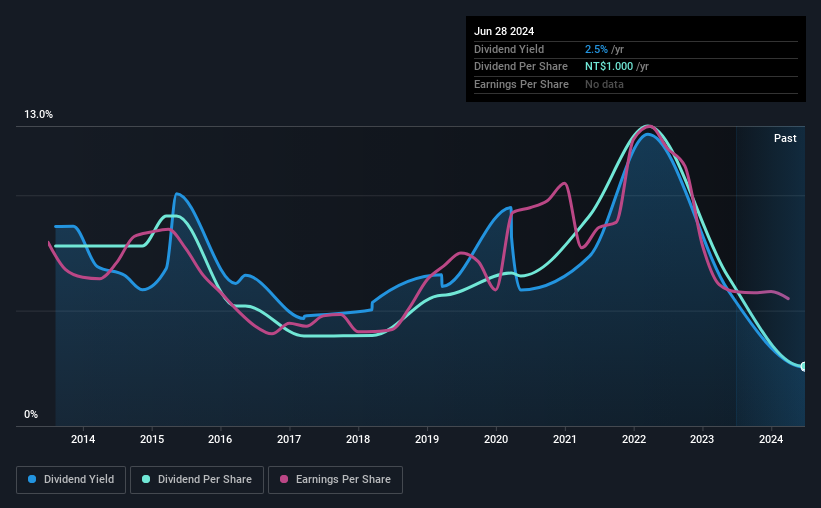- Taiwan
- /
- Electronic Equipment and Components
- /
- TWSE:8213
Taiwan Printed Circuit Board TechvestLtd (TWSE:8213) Has Announced That Its Dividend Will Be Reduced To NT$1.00
Taiwan Printed Circuit Board Techvest Co.,Ltd. (TWSE:8213) is reducing its dividend from last year's comparable payment to NT$1.00 on the 26th of July. This means that the dividend yield is 2.5%, which is a bit low when comparing to other companies in the industry.
View our latest analysis for Taiwan Printed Circuit Board TechvestLtd
Taiwan Printed Circuit Board TechvestLtd's Payment Has Solid Earnings Coverage
If it is predictable over a long period, even low dividend yields can be attractive. Before making this announcement, Taiwan Printed Circuit Board TechvestLtd was easily earning enough to cover the dividend. As a result, a large proportion of what it earned was being reinvested back into the business.
The next year is set to see EPS grow by 5.8%. If the dividend continues along recent trends, we estimate the payout ratio will be 25%, which is in the range that makes us comfortable with the sustainability of the dividend.

Dividend Volatility
Although the company has a long dividend history, it has been cut at least once in the last 10 years. Since 2014, the annual payment back then was NT$3.00, compared to the most recent full-year payment of NT$1.00. Dividend payments have fallen sharply, down 67% over that time. A company that decreases its dividend over time generally isn't what we are looking for.
Dividend Growth May Be Hard To Achieve
Given that the track record hasn't been stellar, we really want to see earnings per share growing over time. In the last five years, Taiwan Printed Circuit Board TechvestLtd's earnings per share has shrunk at approximately 4.5% per annum. If the company is making less over time, it naturally follows that it will also have to pay out less in dividends. Earnings are predicted to grow over the next year, but we would remain cautious until a track record of earnings growth is established.
Our Thoughts On Taiwan Printed Circuit Board TechvestLtd's Dividend
In summary, dividends being cut isn't ideal, however it can bring the payment into a more sustainable range. In the past, the payments have been unstable, but over the short term the dividend could be reliable, with the company generating enough cash to cover it. We don't think Taiwan Printed Circuit Board TechvestLtd is a great stock to add to your portfolio if income is your focus.
Companies possessing a stable dividend policy will likely enjoy greater investor interest than those suffering from a more inconsistent approach. However, there are other things to consider for investors when analysing stock performance. For example, we've picked out 1 warning sign for Taiwan Printed Circuit Board TechvestLtd that investors should know about before committing capital to this stock. If you are a dividend investor, you might also want to look at our curated list of high yield dividend stocks.
Valuation is complex, but we're here to simplify it.
Discover if Taiwan Printed Circuit Board TechvestLtd might be undervalued or overvalued with our detailed analysis, featuring fair value estimates, potential risks, dividends, insider trades, and its financial condition.
Access Free AnalysisHave feedback on this article? Concerned about the content? Get in touch with us directly. Alternatively, email editorial-team (at) simplywallst.com.
This article by Simply Wall St is general in nature. We provide commentary based on historical data and analyst forecasts only using an unbiased methodology and our articles are not intended to be financial advice. It does not constitute a recommendation to buy or sell any stock, and does not take account of your objectives, or your financial situation. We aim to bring you long-term focused analysis driven by fundamental data. Note that our analysis may not factor in the latest price-sensitive company announcements or qualitative material. Simply Wall St has no position in any stocks mentioned.
Have feedback on this article? Concerned about the content? Get in touch with us directly. Alternatively, email editorial-team@simplywallst.com
About TWSE:8213
Taiwan Printed Circuit Board TechvestLtd
Taiwan Printed Circuit Board Techvest Co.,Ltd.
Flawless balance sheet second-rate dividend payer.
Similar Companies
Market Insights
Weekly Picks


Crazy Undervalued 42 Baggers Silver Play (Active & Running Mine)


Fiducian: Compliance Clouds or Value Opportunity?

Willamette Valley Vineyards (WVVI): Not-So-Great Value
Recently Updated Narratives

PSIX The timing of insider sales is a serious question mark


The Great Strategy Swap – Selling "Old Auto" to Buy "Future Light"


Not a Bubble, But the "Industrial Revolution 4.0" Engine
Popular Narratives


MicroVision will explode future revenue by 380.37% with a vision towards success


NVDA: Expanding AI Demand Will Drive Major Data Center Investments Through 2026




